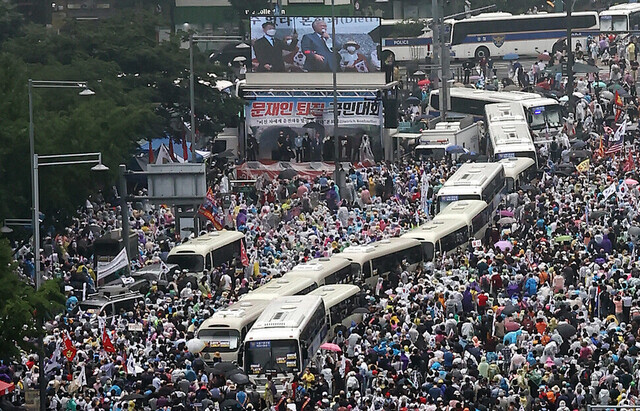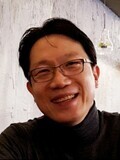hankyoreh
Links to other country sites 다른 나라 사이트 링크
[Column] Why support for the Democratic Party has rapidly declined

Only 100 days or so after the Democratic Party secured a whopping 180 seats in the National Assembly election, public opinion in South Korea is undergoing a rapid turnaround. A Real Meter poll showed negative ratings of President Moon Jae-in’s performance far surpassing approval; a Gallup Korea poll showed approval ratings below 40%. The United Future Party (UFP) has either surpassed the Democratic Party outright or made rapid gains against it in terms of party support.
More important than the approval ratings themselves is the qualitative change in them. In addition to independents and voters in their 20s and 50s, two key support bases for the ruling party -- those in their 30s and 40s and younger women -- have turned their backs en masse. It’s a phenomenon we didn’t witness even when the scandal surrounding former Justice Minister Cho Kuk reached its apex. Taken together, it’s a situation without precedent in the period since the impeachment of former President Park Geun-hye in 2016.
What happened? Some have attributed it to a series of setbacks such as skyrocketing real estate prices and allegations of sexual harassment involving the late Seoul Mayor Park Won-soon. Others have accused the Democratic Party of refusing to cooperate with the opposition, choosing instead to “go it alone” and rely on its National Assembly majority. There is some logic to these explanations -- but they don’t explain everything.
The rise in real estate prices is a serious issue, but not one that came about after the general elections. Cooperation across party lines is a good thing, but support ratings didn’t drop like this amid refusals to cooperate in the past. So why the sudden turn in public opinion now?
In my view, it’s the result of two forces working together. One of them is the “ruling party variable.” When a party possesses such enormous power, it can give the impression that it’s “lording over” the public, that it’s considering only the most passionate supporters while ignoring the overall good. The other is the “opposition party variable.” The conservative opposition has been shifting its agenda, discourse, and battle plan as it seeks to broaden its support base. The combination of these two situations side-by-side is heavily swaying the public. Rather than ignoring the situation or seeking only to defend itself, the ruling party should be asking what it’s been doing wrong and listening to what people have to say.
To begin with, there’s been too much of an emphasis on policies with only a slim level of interest and support behind them. While something like the “Korean New Deal” has the position to win broad-based support, other industry-fostering policies like the “Digital New Deal” do not interest the majority of South Koreans. Prosecutorial reform measures have been high-profile since the get-go, but the support base remains limited. Recent surveys by Media Research and Rnsearch showed just over 30% of respondents reporting a favorable view of the Justice Minister Choo Mi-ae’s actions. Back in 2004, President Roh Moo-hyun’s Yeollin Uri Party focused its efforts on political reforms in the wake of its general election victory, only to lose everyone but its most fervent supporters later on.
Focus on issues that have little to do with the pandemic or economic crisisAlso hastening the decline in support ratings is the emergence of issues that have little to do with the current economic crisis, such as the relocation of the administrative capital and the exhumation of pro-Japanese collaborators. These policies are extremely divisive to begin with -- but the even bigger issue is that these odd controversies continue to crop up with the ruling party at a time when the public is seething over the COVID-19 pandemic and real estate issues. People are crying out about how they’ve lost their jobs or how housing prices are skyrocketing; meanwhile, politicians are talking about how we should “move the capital” or “relocate graves.” This leaves the public feeling infuriated over what they see as disrespect and neglect.
To be sure, the administration and ruling party have been pushing various plans for economic and social reforms. The problem is that it takes a while before new institutions become established and people start to reap the benefits. In the case of a sick leave system to allow people to take days off when ill, the government plans to commission a study in 2021 and conduct a pilot effort with low-income demographics in 2022. A national employment insurance scheme is expected to be completed by 2025.
Next administration may reap benefits of current policiesThese are very important policies, but many South Koreans are not feeling their impact at the moment. There is a strong chance that things will turn into a situation where the current administration focuses its efforts on policies, only for the next administration to reap the political rewards. For that reason, it should be considering ways of maximizing its political support by responding more proactively to pressing issues.
The strengthening of public health services is one example of this. In South Korea, the number of public sickbeds amounts to just 10% of the total -- compared with 69.5% in Australia, 62.5% in France, and 40.6% in Germany. A Gallup Korea survey in June showed fully 94% of respondents supporting public responsibility for health services and an examination of national and public healthcare institutions. A lack of sickbeds comes as frightening news at a moment like the present one with the renewed surge of COVID-19 cases. At such a time, a forceful pursuit of public health service expansions by the government seems like it would be very well received by the public.
The US political scientist Elmer Eric Schattschneider famously said, “A new policy creates a new politics.” Policies aren’t just prescriptions for longstanding issues; they’re a strategy to open up new politics. The ruling party enjoyed a major victory in the general elections by focusing on its COVID-19 response in the weeks leading up to the election. If it hopes to achieve longer-term reforms, it will need to win post-election support with policies that have a direct impact on the public’s livelihood.

By Shin Jin-wook, professor of sociology at Chungang University
Please direct comments or questions to [english@hani.co.kr]

Editorial・opinion
![[Column] Season 2 of special prosecutor probe may be coming to Korea soon [Column] Season 2 of special prosecutor probe may be coming to Korea soon](https://flexible.img.hani.co.kr/flexible/normal/500/300/imgdb/original/2024/0426/3317141030699447.jpg) [Column] Season 2 of special prosecutor probe may be coming to Korea soon
[Column] Season 2 of special prosecutor probe may be coming to Korea soon![[Column] Park Geun-hye déjà vu in Yoon Suk-yeol [Column] Park Geun-hye déjà vu in Yoon Suk-yeol](https://flexible.img.hani.co.kr/flexible/normal/500/300/imgdb/original/2024/0424/651713945113788.jpg) [Column] Park Geun-hye déjà vu in Yoon Suk-yeol
[Column] Park Geun-hye déjà vu in Yoon Suk-yeol- [Editorial] New weight of N. Korea’s nuclear threats makes dialogue all the more urgent
- [Guest essay] The real reason Korea’s new right wants to dub Rhee a founding father
- [Column] ‘Choson’: Is it time we start referring to N. Korea in its own terms?
- [Editorial] Japan’s rewriting of history with Korea has gone too far
- [Column] The president’s questionable capacity for dialogue
- [Column] Are chaebol firms just pizza pies for families to divvy up as they please?
- [Column] Has Korea, too, crossed the Rubicon on China?
- [Correspondent’s column] In Japan’s alliance with US, echoes of its past alliances with UK
Most viewed articles
- 1The dream K-drama boyfriend stealing hearts and screens in Japan
- 2‘We must say no’: Seoul defense chief on Korean, USFK involvement in hypothetical Taiwan crisis
- 3AI is catching up with humans at a ‘shocking’ rate
- 4S. Korea “monitoring developments” after report of secret Chinese police station in Seoul
- 5[Column] Can we finally put to bed the theory that Sewol ferry crashed into a submarine?
- 6[Editorial] Yoon cries wolf of political attacks amid criticism over Tokyo summit
- 7[Photo] “Comfort woman” survivor calls on president to fulfill promises
- 8Doubts remain over whether Yoon will get his money out of trip to Japan
- 9Up-and-coming Indonesian group StarBe spills what it learned during K-pop training in Seoul
- 10[Editorial] Was justice served in acquittal of Samsung’s Lee Jae-yong?